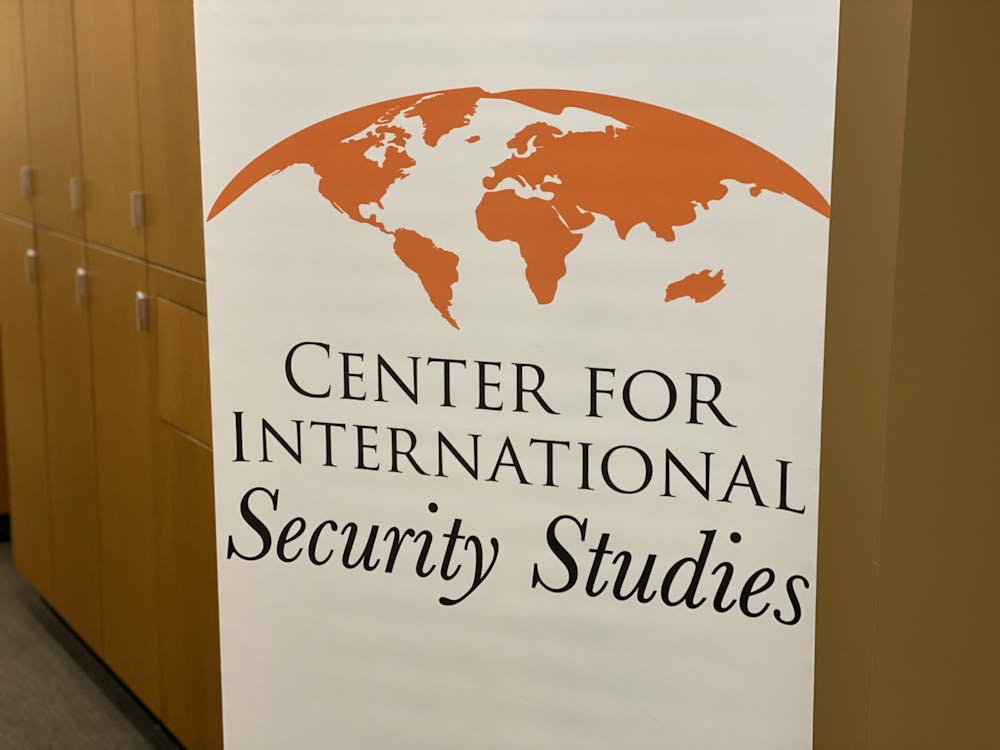The logo of the University’s Center for International Security Studies (CISS) depicts a world map cast as an orange oval. The image features a clear outline of six world continents, prominently displaying North and South America, Africa, Europe, and Asia, as one might expect.
Upon further examination, however, the map does not depict the entire world. CISS’s emblem doesn’t include island nations such as New Zealand, the United Kingdom, Madagascar, Japan, and Indonesia. According to Tan Shanker ’20, that’s an issue.
“Lots of people I spoke to are saddened by this,” he said. “It might not be the biggest issue on campus, but … people are upset, and it’s not that big of a deal to fix it.”
Shanker is leading an initiative to modify the logo. Through Google Forms, the New Zealand citizen has garnered over 335 signatures of support, at least 315 of which come from undergraduates.
“We strongly believe that this abhorrent omission fosters a non-inclusive and isolating environment on campus that makes me and many others feel out of place,” the digital petition reads. “It is ironic that the Center for ‘International’ Security Studies cannot accurately represent the global world and omits over 700 million people’s homes from their logo.”
The petition, authored by Shanker and the Princeton New Zealand Club, goes on to claim the support of a number of regional organizations on campus, including students from Great Britain, Vietnam, the Caribbean, Malaysia, Singapore, Japan, Norway, the Philippines, Taiwan, and Sri Lanka.
“I just think [CISS doesn’t] take the issue seriously,” Shanker elaborated. “I think they just don’t think this is an issue, and I’d just like to talk to them about it.”
G. John Ikenberry and Aaron L. Friedberg, the co-directors of CISS and two professors of politics and international affairs, emphasized the extent to which they view the Center’s logo as aesthetic, rather than factual, in a statement to The Daily Princetonian.

“The CISS logo is an artistic image of the globe rather than a world map … and … does not include a lot of places,” the two wrote. “We certainly did not intend to give offense to any of those whose home countries or places of origin are not represented.”
“While we appreciate having this matter called to our attention, we do not have any plans at present to change the CISS image,” Ikenberry and Friedberg added.
In an initial message from Shanker asking about the possibility of a logo change, Carlton Haelig and Bailey Scott, the director and deputy director, respectively, of the CISS’s Strategic Education Initiative, echoed a similar sentiment.
In his correspondence with the organization, Shanker argued that “with 12 undergraduate students, over 20 graduate students, and several faculty hailing from our nation, we would like to think that New Zealand thoughts, culture, and life should be welcomed on campus.”

In the same email, he described the image issue as one “that has been plaguing the Princeton New Zealand community.”
During an interview with the ‘Prince,’ Shanker noted that, while he took up the mantle of petitioning CISS because of his New Zealand roots, he’s campaigning on behalf of all nations excluded by the image.
Vivien Huang ’22, a resident of Auckland, New Zealand, and a signatory of the petition, sees the cause as significant.
“It is really important to not erase that part of the world,” she said. “What makes a place like Princeton … [so] awesome … [is] that you get to interact with all these different international communities and people — you have to recognize the distinct identities.”
The petition emphasizes the notion of recognition.
“Imagine having to walk past this logo everyday, feeling unwanted and irrelevant while simply going to class,” the document reads. “[Imagine h]aving your family visit campus from across the world and explaining to them how your home country is not important enough to be featured on one of Princeton’s logos. [Imagine b]eing made fun of because your entire nationalistic identity can be invalidated based on an oversight that the department refuses to fix.”
Signatories to the petition hail from nations beyond those excluded. Originally from Pakistan and currently a resident of the United Arab Emirates, Khadijah Anwar ’22 emphasized the need for geographic parity.
“If [CISS claims] … to be a body that is fostering discussion of international issues on campus, then every part of the world should be fully acknowledged and included in the map,” Anwar said. “For certain islands to just be omitted altogether from something that is supposed to be an international representation — I just think that that’s inherently unfair.”
Seeking further support in his endeavor, Shanker reached out to the New Zealand Embassy in Washington, D.C., via email. The Embassy confirmed in a response that his message “ha[d] been forwarded to the Public Affairs officer” but made no further comment on the matter.
At the time of publication, the Embassy had not responded to a request for comment.
This isn’t the first time Shanker has advocated for the inclusion of his home country in University geography. During his first year on campus, he successfully lobbied Mathey College to change a map in favor of one that included New Zealand.
“[It] bummed me out to see that everyday,” Shanker noted.








